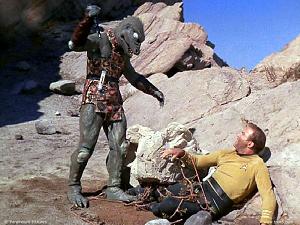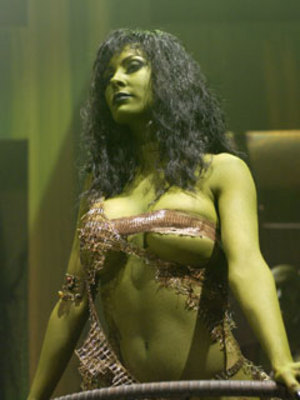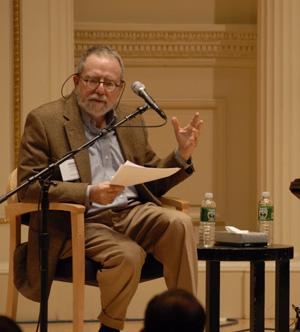Fan Hatred: When Geeks Get Too Critical
Like most of my peers, I grew up on Star Wars and Star Trek. As a fan of both, along with other things like Heroes, Titanic, and the Matrix movies, there’s a disturbing trend I have to deal with on a fairly regular basis: the popularity to hate what is loved.
 | | If you want to get a sense for what I'm talking about, ask anybody in this room what they think of the new G.I. Joe movie |
There’s really nothing worse than somebody who speaks Klingon telling you that Enterprise is the worst show on television or that Star Trek: Nemesis is a terrible movie on par with a Sci-Fi Channel Original Picture. Even worse is a guy who owns expensive replicas of every lightsaber from the original Star Wars movies expounding upon what an awful guy George Lucas is for killing his childhood.
What has happened to bring us to this point? There are, of course, two possibilities.
The first is that new iterations of once sacred franchises are far and away so miserably unentertaining that watching them is tantamount to torture. Indeed, many a modern fanboy will tell you that this is the case, especially with things like The Phantom Menace or Indiana Jones and the Kingdom of the Crystal Skull. Sometimes, especially in the latter example, a strong argument can definitely be made. Does that make it right for a fan of the original Star Wars trilogy to want to kill George Lucas and spit on his grave for the more recent films, despite the fact that the very stories deemed sacred by that fan were also created by him? Is it fair to put Attack of the Clones on the same popularity blacklist as Batman & Robin?
The other possibility is that popular negative opinion is wrong or overblown. As I see it, this is the more likely and more common scenario, and it comes out of a simple psychological problem.
 | | The past is not flawless... |
Memories are inherently biased. If the original Star Wars (A New Hope or Episode IV, if you prefer) were released today, people in their late twenties and early thirties would no doubt rip it apart for bad acting, stilted dialogue, and a silly plot, the same complaints being leveled against things like Star Wars: The Clone Wars. And don’t even get me started on the original Star Trek. In these cases, childhood memories have warped objectivity—as they are prone to do—while updated and brand new versions of old favorites sometimes lack the forgiving nature of a childish perspective. Be honest with yourself; what would you have thought of Terminator 3: Rise of the Machines when you were ten?
It doesn’t have to be something from as far back as the sixties or seventies, either. Professed fans of the first season of Heroes are quick to judge the current season (which we are currently only two or three episodes into) for confusing character motivations and storylines full of plot holes, which seems to imply the false notion that the first season had no strange character choices or continuity errors. In short, we tend to put even the recent past on a pedestal the present will never live up to. Our sacred cows, if looked at objectively, are not flawless, and yet, on the whole, we treat them like they are.
 | | ...and updates aren't always a bad thing |
Additionally, many people, especially fanboys, are prone to having overblown expectations. We can easily get caught up in our own ideas of what we want to see happen next or how we think we would handle our favorite characters and storylines. I myself do it all the time (check out my blog about The Future of Zelda). When these expectations are predictably thwarted by reality, some of us get mad, and no matter what is shown to us, it’ll never be as good as what we imagined. Therefore, a lot of people feel betrayed by the thing they used to love, and the only people they have to blame for it are themselves. They start talking about “potential” and using ultimatums like, “If they don’t do what I know they’re capable of, I’m going to stop watching this show!”
There are other reasons for this disturbing trend. Take Titanic, for example, a movie so scorned in popular opinion nowadays that you would never guess it remains the top grossing film of all time. This movie is not part of some franchise that people look back on fondly, and yet there was a drastic swing in the opinions of my peers within the first year of its release.
No matter what anybody tries to tell you, Titanic is a well-made movie deserving of a lot of credit. It taps very effectively into the romantic fascination of the past, the same fascination that makes Star Trek II: The Wrath of Khan immune from modern criticism. The fact that millions upon millions of people flocked to the theaters to see Titanic multiple times while it was still in theaters—despite the risks of serious trauma from repeated listenings of that Celine Dion song—is proof enough that the film speaks to something common in the human condition. Why, therefore, is it so popular to hate it? Why, despite incredible performances in What’s Eating Gilbert Grape?, The Basketball Diaries, Catch Me if You Can, The Departed, Blood Diamond, and many other movies, is Leonardo DiCaprio still despised for his work in the most successful film ever made?
 | | Yes, I said it; Titanic is a great movie and Leonardo DiCaprio is a good actor. Wanna fight about it? |
The best answer I can come up with is that Titanic was simply too popular. I can already sense, off on the distant horizon, a growing shrug of ambivalence for The Dark Knight—the second highest grossing movie of all time—for the very same reason, even though it’s initial reception was nothing but a clamor of adoration and almost religious praise. Before that happens, though, let me be clear: The Dark Knight is a great movie, deserving of every bit of praise, and it will not deserve the coming backlash. (I predict something similar will happen with the new Star Trek coming out next year; regardless of its quality, many geeks will hate it, although it will probably have more to do with overblown expectations and unrealistically high pedestals than with popularity.)
This has also happened to things like Star Wars, Heroes, and many, many others. Due to the buzz, hype, and overall popularity of these franchises, a few bitter pills want to exert their individuality by spouting negative opinions and pointing out flaws. Everybody is certainly entitled to his or her opinion and I don’t mean to imply that those opinions are necessarily wrong, but over time, these critiques snowball to the point that even dedicated fans start having second thoughts. In the case of Star Wars, most professional critics were never kind to the franchise, but now, fans who’ve turned to the dark side point to the same critics they used to ignore as justification for their assertion that anything new in the Star Wars universe is pure garbage. Heroes suffered a similar fate, and a few problems in the early second season—problems real enough that the showrunner felt the need to publicly apologize for them—wound up costing the show its street cred. Now, no matter how good the show becomes, hordes of people will be critical of it for the rest of its inevitably shortened run, though these same armchair critics will no doubt continue to tune in week after week so they can proselytize how unentertained they are by it on Internet message boards. It might recover—the way Lost did last season—but from what I’m reading out there, I don’t think anything at all will please the critics anymore.
 | | Always remember: critics like this guy, the New Yorker's David Denby—who called The Dark Knight "incoherent" while calling Hancock "the most enjoyable big movie of the summer"—are assholes! |
This is because there is no movie or television show, even the sacred ones of yesteryear, that is perfect. Also, pointing out flaws and nitpicking do not necessitate hatred or even dislike. You can love something and still pick apart its flaws (just ask my wife). It can even be a pastime—like it is for me when it comes to Star Trek—and yet those flaws do not have to negate your love of the experience. In fact, some nitpicks are so specific that you’ll only realize them if you’ve spent a great deal of time thinking about the movie or show, so much time that you’d almost have to be fan.
But those who’ve become invested in their negative opinions will use every nitpick and flaw as evidence that the popular franchise isn’t worth such time. There is nothing you can say to them to change their minds, and that is a shame. Really, once you start to hate what you once loved, you become joyless and bitter and risk the possibility that you never loved it in the first place. If you can no longer be entertained by something because all you see are its flaws and lost opportunities, there is probably nothing left that can satisfy you. You might as well just put a gun in your mouth and end it all. At least that way, you can stop bothering those of us stupid enough to actually enjoy things.
I’m not ashamed to say I love the following: Star Wars Episode I: The Phantom Menace, Star Trek: Enterprise, Lost (even season 3!), Titanic, Heroes, The Sum of All Fears, The Matrix Revolutions, Star Wars: The Clone Wars, Star Trek: Nemesis, X-Men: The Last Stand, Live Free or Die Hard, and Terminator 3: Rise of the Machines. Upon occasion, I don’t even think Jar Jar Binks is that annoying. If you want to flame me for it and call me retarded, please do not leave comments below, as I will delete them; there’s just way too much of that crap on the Internet. However, if you have something constructive, meaningful, and positive to say, I will not censor your thoughts.
-e. magill, 09/29/2008
|
|